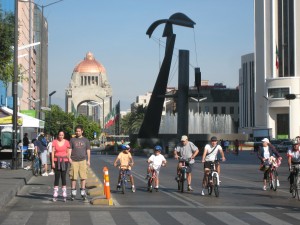My monthly advice column for students is available on the Planetizen web site. Important topics include:
- Deciding on planning as a career: how to decide if planning is for you (with an update on the core themes of planning).
- Finding a compatible program: what makes a great planning program, finding the right program, evaluating universities, using social media to find out about schools, and understanding the basic philosophies underlying graduate education in planning. Also whether to do a PhD or not, and even how to find an undergraduate planning program.
- Getting into planning school: how to apply, whether to get work experience before you go to grad school, and how to write a statement of purpose. Also obtaining letters of reference, assessing your undergraduate transcripts and your GREs, visiting successfully, and deciding which offer to take up including how to assess the real costs.

Cycling in Mexico City from the Design for Health image collection (one of the collections curated by faculty) - Preparing yourself for working on the design side of planning including deciding on what educational track to take, preparing a portfolio, finding images,finding more images, and finding images curated by faculty.
- Undertaking the exit project, capstone, or thesis. Topics include the what, why, and when of choosing an exit option, getting started, troubleshooting common problems, managing your committee, using sources, writing a literature review, and actually finishing.
- Making the most of being a student, selecting courses and teachers, choosing a concentration, finding case studies, managing your adviser, learning when (not) to email experts, deciding on conferences, and finding things to do in the summer including internships.
- Finding online resources to increase your planning knowledge including:general information about the field of planning, more scholarly information, images, more images, articles, organizations, faculty blogs, more faculty blogs, even more faculty blogs, social media sites of planning programs. books, more books, even more books and readings, history sources, famous plans, famous places, planning process resources, and movies.
- Developing skills in planning including: writing, more writing, writing (short and long), how (not) to write, finding sources, using sources, reviewing, managing time, and creating a portfolio.
- Finding a job including using the internet wisely for job hunting, more on job hunting,thinking broadly about job options, planning a job hunt timeline, and tips on staying gainfully unemployed if you can’t. See the bullet on being a student for advice about internships.
- Finding planners with shared interests and finding alternative ways of learning about places apart from travel.
